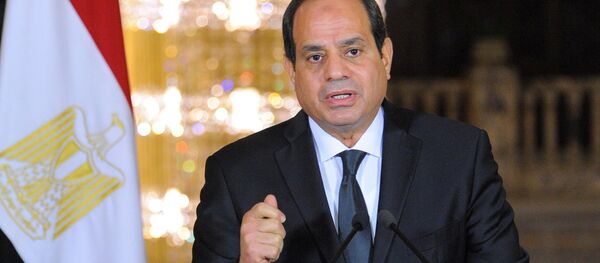Kristian Rouz — The Egyptian economy is gradually returning to a stable pace of expansion after years of turmoil caused by the Arab Spring earlier in this decade, as well as subsequent wild fluctuations in international oil prices. The latest positive batch of data comes as Egypt is exiting an assistance programme by the International Monetary Fund (IMF), with officials expecting GDP growth to remain sustainable in the near-to-medium-term.
Egypt's non-oil PMI came in at 50.8 compared to 49.9 in March. The index is compiled on a basis similar to surveys conducted by London-based IHS Markit, with readings above 50 indicating expansion. This is one of the three positive PMI readings since mid-2015, and economists say Egypt could return to stable growth in the non-oil sector, although adding it's still too early to tell.
"The improvement from the first quarter, the PMI index averaged just 48.9 over January to March, was broad-based, with most of the index's subcomponents returning positive 50-plus readings", Daniel Richards of Emirates NBD said.
READ MORE: Arab League Giving $100 Mln Will Do Little to Correct Structural Problem — Prof
Additionally, Egypt's economic output has also returned to positive territory, having increased to 51.1 in April from 49.9 the previous month. This despite Egypt's non-energy exports still shrinking amid a lack of new exports contracts, but many companies have refocused on the domestic market instead.
Meanwhile, some Egyptian firms have increased their shipments to customers in Japan, Turkey, and Italy.
"Firms noticed a stronger demand, and a positive reading for new orders for the second month in a row bodes well for this continuing over subsequent readings", Richards said.
Economists believe Egypt's economy could grow 5.5 percent in the second quarter of this year, in line with the 5.0-5.4-percent expansion since early 2017. However, analysts say Egypt's non-oil sector is still struggling to attract foreign investment, which has been tepid since the ouster of Hosni Mubarak in 2011.
Cairo's growth prospects now appear to be brighter than in the previous year, as the threat of destabilising factors inside Egypt has decreased, economists say, allowing the government to pay closer attention to the goals of national development.
READ MORE: GNA Says Egypt's Statements on Libya Misrepresent True Situation
"Medium-term economic growth is underpinned by improving fiscal finances, reforms to strengthen the business environment and rising investment in key sectors", Nadene Johnson of NKC African Economics said. "But structural constraints are keeping the growth forecast slightly subdued".
These changes are expected to make the Egyptian economy more competitive on the international arena. However, some say the living standards of most Egyptians have not improved for years, and painful reforms could undermine public confidence in al-Sisi's economic policies.
But experts point to labour market improvements, as more Egyptians are now gainfully employed for the first time in many years.
"Nevertheless, they appear to be more confident with regards (to) future conditions", Emirates NBD's Richards said. "This greater optimism is reflected in their hiring, as employment returned a reading above 50.0, albeit marginally, for the first time since 2015".
READ MORE: Arab States Waiting for Israel's Response to Peace Initiative — Politician
The World Bank has welcomed Egypt's progress on the path of economic reforms. Officials believe the North African country could see gradual and stable improvements in the business climate, household incomes, and budget revenues in the years to come.






